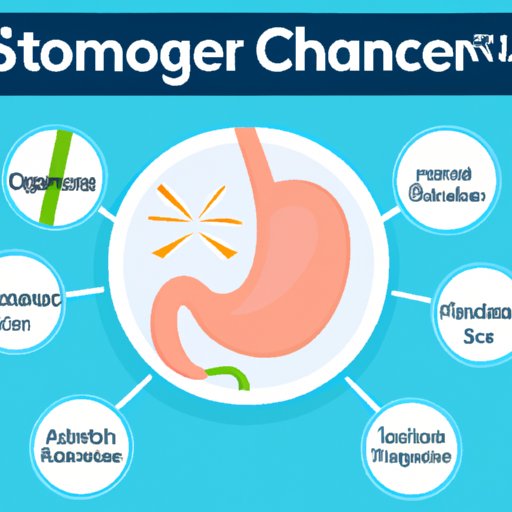
Introduction
Stomach cancer, also known as gastric cancer, is among the top ten most common forms of cancer worldwide. Detecting it early is crucial as it is more treatable in the early stages. With early detection, there are several treatment options available, including surgery, chemotherapy or radiation therapy. In this article, we will explain the ways to detect stomach cancer early, including the symptoms, screening methods, risk factors, prevention tips, and treatment options.
Symptoms of Stomach Cancer
The signs of stomach cancer can be vague and often go unnoticed, particularly in the early stages. As it grows and progresses, various symptoms may arise, which includes:
- Persistent stomach pain or discomfort
- Feeling of fullness, even after a light meal
- Unexplained weight loss
- Nausea or vomiting
- Loss of appetite
- Difficulty swallowing
- Indigestion or heartburn
If you notice any of these symptoms, see a doctor right away. An early diagnosis can lead to effective treatment.
Screening Tests
If stomach cancer is suspected, there are several screening methods your doctor may use to make a diagnosis, which include:
- Physical exam: Check for lumps or growths in the abdomen.
- Blood tests: Measure the presence of a protein known as tumor markers.
- Endoscopy procedures: Utilize a flexible tube with a camera and light on the end to examine the stomach and collect tissue samples for biopsy.
- Biopsy: Remove small pieces of tissue and examine them for cancer cells in a laboratory.
- Imaging tests: Use CT, MRI or PET scans to see more clearly inside the body and look for tumors.
Working with your healthcare provider, you can determine which screening method is best for you.
Risk Factors
There are several factors that can increase your risk of developing stomach cancer, which include:
- Age: Older individuals may be more prone to stomach cancer.
- Smoking: Tobacco use has been linked to a higher risk of stomach cancer.
- A family history of cancer: A family history of stomach cancer may increase your risk of developing it.
- Infections: Some infections can increase your risk of stomach cancer, including Helicobacter pylori (H. pylori).
- High salt and smoked food intake: Foods high in salt and smoked foods may increase your risk of developing stomach cancer.
- Previous stomach surgeries: Certain previous surgeries may increase your risk of developing stomach cancer.
Experts encourage regular physical checkups and communication with your doctor to manage risk factors and stay healthy.
Prevention Tips
There are several ways you can lower your risk of developing stomach cancer, including:
- Healthy diet: Eating a balanced diet low in salt and smoked foods can reduce your risk of developing stomach cancer.
- Avoiding tobacco and alcohol: Minimizing the use of alcohol and quitting tobacco can reduce the risk of developing stomach cancer.
- Getting vaccinated: Vaccination against H. pylori and hepatitis B can reduce the risk of developing stomach cancer.
- Regular exercise: Exercising regularly can lower the risk of developing stomach cancer.
- Maintaining a healthy weight: Keeping a healthy weight and eating healthy can lower the risk of developing stomach cancer.
By taking these preventative steps, you can significantly reduce your risk of developing stomach cancer.
Treatment Options
When caught early, there are several effective treatment options available for stomach cancer, which include:
- Surgery: Depending on the cancer stage, surgery may be an option to remove portions of the stomach.
- Chemotherapy: May be used to reduce the size of cancerous growths before surgery, after surgery to kill any remaining cancer cells, or instead of surgery in advanced stages.
- Radiation therapy: Uses high-energy rays to kill cancer cells.
Your healthcare provider can guide you to the best treatment option based on your diagnosis and overall health.
Personal Stories
Many people who have caught stomach cancer early have a better chance of successful treatment. Real-life examples, such as of Vicky, who caught stomach cancer early and underwent surgery, said:
“I had no problem after the operation, and I could walk on my own. My husband and I were so relieved and happy that the cancer was gone. We felt like we could start a new life again.”
To learn more about people’s experiences with early-stage stomach cancer, talk openly with your healthcare provider or search for online forums.
Conclusion
While stomach cancer may seem daunting, an early diagnosis can greatly increase your chances of successful treatment. Knowing the symptoms, risk factors, and prevention tips can help you take action and protect your health. If you experience any of the symptoms or have personal risk factors, or if you have concerns about stomach cancer, discuss your concerns with your healthcare provider.




